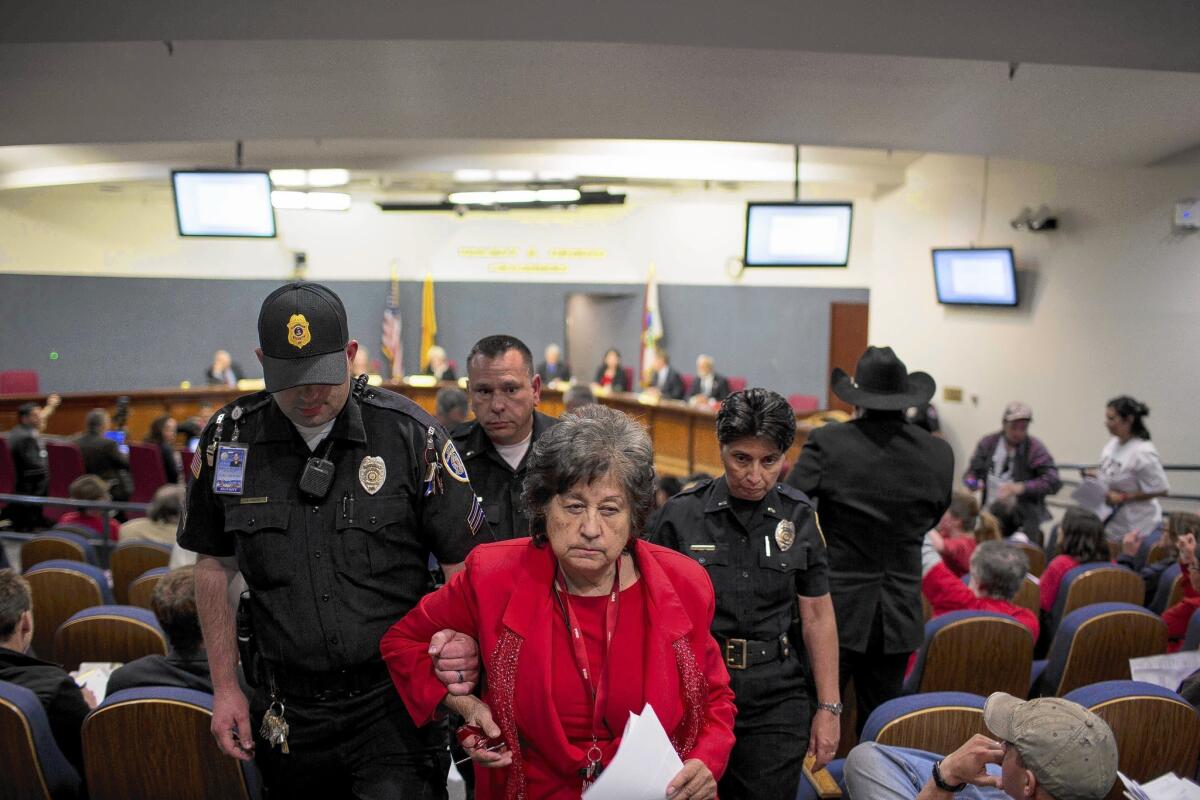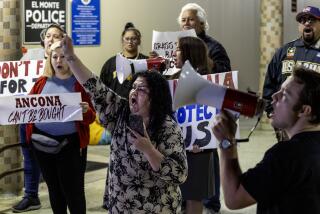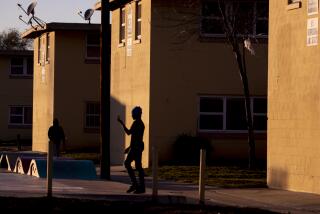Tensions over Albuquerque police shootings intensify despite talks

A day after a tense City Council meeting — in which six protesters were forcefully ejected from the council chambers and cited for criminal trespass — the parties warring over Albuquerque’s troubled Police Department were asked by federal officials to sit down and talk out their differences.
On Friday, city officials and some concerned citizens did just that.
But as often seems to happen when the Police Department comes up for discussion these days, opinion was divided. City officials called the session productive. Citizens left the meeting somewhat unsatisfied. The tension that has embroiled this high-desert city of 550,000 does not appear to be abating.
The Police Department has had 25 fatal officer-involved shootings in the last four years. Four weeks ago the U.S. Department of Justice released a harsh report calling many of the deadly shootings unjustified and saying a culture of “aggression” exacerbated the problem. The report recommended several steps, such as better hiring practices and officer training, to change that culture.
The report, and yet another police shooting last Saturday, have fueled the tensions.
Ralph Arellanes, the state director of the League of United Latin American Citizens, attended Friday’s meeting, which was organized by the Department of Justice. Arellanes said he tried to relay the frustrations of community members, telling Mayor Richard J. Berry that some of the Justice Department recommendations should be implemented right away.
“People are anxious and frustrated. People are still being shot.… There are things you could do now,” he said he told Berry. “The window dressing needs to stop now.” Arellanes said that Berry nodded and said he understood.
Berry has held several community meetings and will continue to do so, said the mayor’s spokeswoman, Erin Thompson. “I understand it was a very meaningful and productive discussion,” she said of Friday’s meeting.
Some of the Police Department’s harshest critics were not invited to the meeting, and on Friday some activists mistakenly thought Berry had left them out. They called it another example of the mayor ignoring their interests, not finding out until later that the Justice Department had organized the meeting.
Tension has been high for some time but took on new intensity this week. On Monday a City Council meeting had to be adjourned early after rowdy protesters disrupted the proceedings and took over the meeting.
The council met again Thursday to discuss changing how the city selects its police chiefs. Council President Ken Sanchez warned audience members that they would be evicted if they misbehaved and that rules of decorum would be strictly enforced.
Seven people offered a novel protest: Wearing red to symbolize the blood of those killed by police, they went up to the lectern, turned their backs on the panel and remained mostly silent.
Sanchez ordered them to be taken away. One woman chose to leave on her own. Six others were forced out, given the citation and banned from setting foot in the county and city government complex — about an entire block in downtown — for 90 days.
Council Member Rey Garduño challenged Sanchez and asked why speakers could not remain silent during their two minutes. Because it violates the rules of decorum, Sanchez said.
That penalty seemed to surprise at least some of the council members, who said at the meeting that they disagreed with the ban and asked for it to be looked into.
If the citations and bans are not dropped, the protesters have vowed, they will challenge them in court as well as by “other means,” said David Correia, one of the protesters.
Most of the speakers criticized the police, but two backed the agency.
One was Jennifer Otte, who told the council, “The protesters keep beating a dead horse, but they don’t give solutions.”
Otte said in an interview before the meeting that Albuquerque is safer because of the police, and she credited the department with saving her from “alcohol issues.”
“I’m living proof that Albuquerque police [are] doing their job,” she said.
Another speaker, Kenneth Ellis, told the council that officers had killed his son. Kenneth Ellis III, a 25-year-old Iraq war veteran with post-traumatic stress disorder, was shot to death in 2010.
His case was cited in the Justice Department report, which said officers had acted unreasonably because the younger Ellis posed a danger only to himself when he held a gun to his head.
Garduño apologized to Kenneth Ellis for his son’s death.
“I hope you know how much in solidarity I am with all of you,” Garduño said.
Then he said, “Sorry,” and Ellis seemed to tear up.
“You are the first official to say that to me formally,” he said. “Thank you very much.”
More to Read
Start your day right
Sign up for Essential California for news, features and recommendations from the L.A. Times and beyond in your inbox six days a week.
You may occasionally receive promotional content from the Los Angeles Times.







